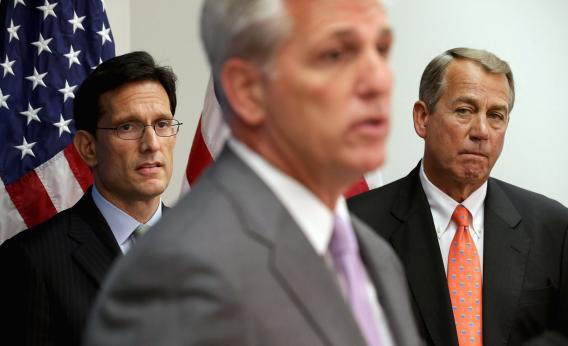I’ll confess that I’ve been ignoring various missives about the THUD approps bill (that’s the annual appropriations bill for the Department of Transportation and Department of Housing and Urban Development) for a couple of weeks now, but the fact that GOP leaders had to yank it from the floor late this afternoon is a big deal.
The backstory, as Brian Beutler eloquently explains, is that the comeuppance Democrats have in some ways been expecting for years finally seems to have arrived. In its various iterations, Paul Ryan’s budget documents have implicitly called for massive cuts in domestic discretionary spending that are far beyond anything any practical governing majority in congress has ever attempted to do. But as long as the debate stayed at the level of the budget, those cuts were entirely abstract, vague, and general. It’s when you get down into the weeds of the appropriations process that you have to say “so much less for this program, so much less for that program” that things get thorny. This year, House Republicans intend to write domestic appropriations bills down to the Ryan level. And yet the THUD bill proved to cut too much—the specific issue looks to have been a 50% whack given to Community Development Block Grants—to secure majority support in the House. So it’s back to the drawing board.
Mathematically speaking, the problem here is somewhat similar as to the failed farm bill where writing a bill that was acceptable to the median House member proved insufficiently right-wing for a critical mass of House conservatives.
It’s in the conjunction of these two failures that you see a mortal threat to the practical existence of the Republican governing majority in the House. That’s because if you can’t find 218 Republicans out of 234 to vote for a bill, the other option is to start with 201 Democrats and try to add two dozen Republicans. And in many ways, that kind of coalition makes more sense given that to become law a bill also needs to pass a majority-Democratic Senate and be signed into law by a Democratic president. A “Pelosi Plus” House bill, in other words, can actually become law whereas a Boehner Majority House bill is at best a bargaining ploy. Now normally that kind of legislation simply can’t move in the House. The party that holds the majority forms a cartel and blocks bills from coming to the floor that don’t have support in the majority caucus. Boehner has allowed select violations of this so-called Hastert Rule (though in practice the rule predates Hastert) but there’s at least a chance that he’ll be forced to suspend it wholesale throughout the appropriations process.
A relevant precedent for this, in some ways, could be seen in the 1981-82 congress that gave us the Reagan Revolution. Republicans won the presidency in the 1980 elections and secured a majority in the Senate, but Democrats still held the House. A large faction of conservative Boll Weevil Democrats were willing to support a lot of Reagan ideas, but that was far from a majority of the House Democratic caucus. But in what I think you’d have to consider a rare concrete example of a “mandate,” Speaker Tip O’Neill let conservative bills come to the floor and let the Democratic majority get rolled by a GOP-Boll Weevil coalition on a bunch of key votes.
The dynamics of a meltdown of the GOP majority would be different from that and so would the legislative outcomes. There won’t be an “Obama Revolution” if the Republicans get rolled, but there just might be bipartisan deals to replace sequestration and reform the immigration system. The Republican majority, in other words, may be nearly immune to electoral defeat thanks to favorable district boundaries—but it’s not immune to its own dysfunction.
